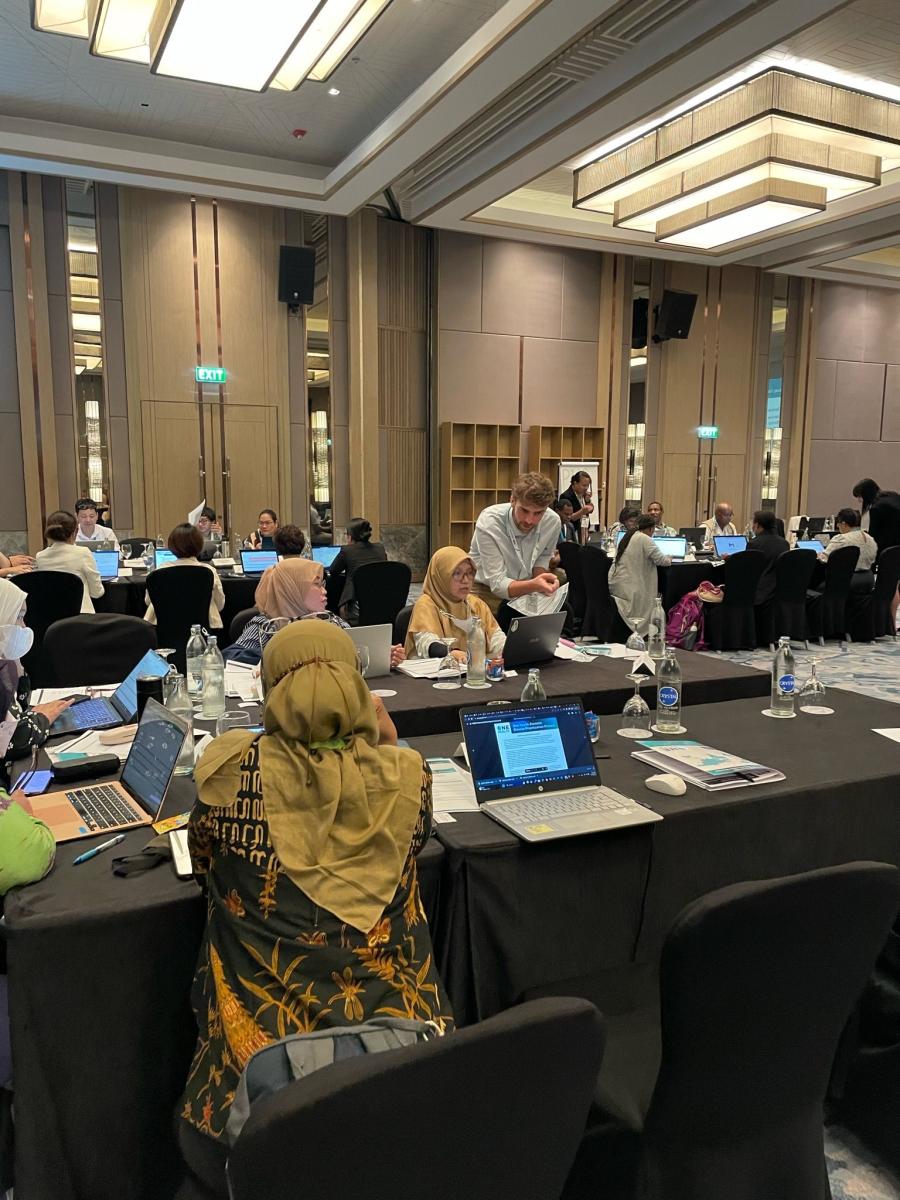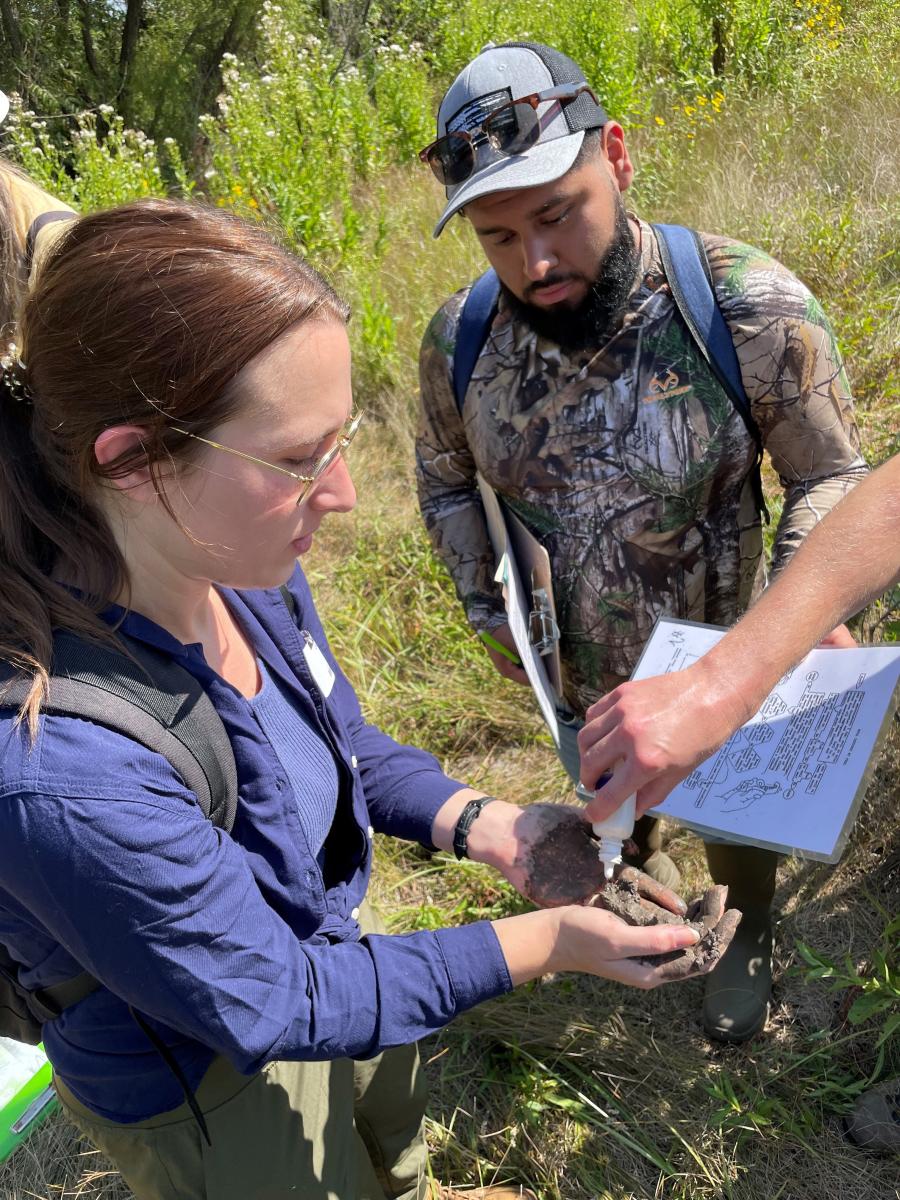
Dominic Cristiano and Daniel Morales, Nebraska alumni, advised students this week in an NRT career panel how to get and keep federal and state jobs, starting with cover letters.
In his position as an ORISE fellow at the Centers for Disease Control and Prevention, Cristiano has served on hiring teams and suggests students heed the specific skills employers ask for, be intentional about how they advertise themselves and tailor letters to jobs.
“It can make a huge difference just tailoring, even if you're not a perfect lineup and you don't have the exact right experience,” Cristiano said. “If you can pull from anywhere that you have somewhat similar experience that might be useful, that’s super helpful to know that you're trying, that you can sell yourself as someone who's able to at least come in and be willing to learn a certain skill or qualification.”
He said he searched for work three to four months before securing the ORISE interview in July 2022 but then “almost blacked out” during the interview.
“I know that I rambled on and that I couldn't remember the things that I was saying,” he said. “I was super nervous. I left the call, heartbroken, thinking, ‘There's no way I got that job. That was the worst interview I've ever had in my entire life.’”
When he was offered the position, he asked the interviewers why they chose him and they said he had written and spoken about One Health, the niche field the fellowship was in.
“I had the familiarity with what we were going to be doing even if I didn't have a giant resume full of really cool things and didn't have a ton of publications,” Cristiano said.
Morales said his interview and hiring as an environmental scientist in January 2023 with the Nebraska Department of Environment and Energy confirmed for him the importance of coming off as likeable to interviewers.
“Besides your skills and how you communicate, they also look at your personality,” he said.
Cristiano agreed that a likable personality was a “big deal” and said less-qualified applicants can still impress people in his office when they ask questions showing they care about the specific position and email their thanks afterward.
Both scientists earned their master’s degrees in natural resources and said the many positions asking for policy experience and work with wetland delineation surprised them.
“If I wanted to get experience in wetland delineation, I would have had opportunities and connections with people at UNL that do that and I could have helped out and gotten that experience,” Cristiano said. “But it just wasn't on my radar because I wasn't already looking at job postings to see what they would be wanting.”
He and Morales suggested students interested in governmental jobs look at current listings to know where to beef up their skills and make themselves more marketable.
Morales works on a team involving other agencies such as the Army Corps of Engineers and the Environmental Protection Agency on assuming Section 404 of the Clean Water Act from the Army Corps of Engineers. Since starting work at the state, Morales has taken a wetland delineation course and done fieldwork with water samples, but mainly he has worked on reviewing documents and drafting an assessment of threatened and endangered species in Nebraska. He spends a good deal of time in meetings with other agencies and lawyers. Learning how to collaborate with people of differing backgrounds and views has proved one of the most important lessons he learned from the NRT, but he could have used other aspects of the experience, he said.

“An experience I wish I had in grad school--but I'm not sure how grad school could mimic this experience--is just agency dynamics, like how one agency has a relationship with another agency,” he said.
Coming into a governmental job, he didn’t realize the differing objectives of the agencies and how those can lead to differences in opinions, he said. Had he known those, he would have been better prepared to work around them, he said.
Cristiano agreed that collaborating with others was one of the most important skills he learned in the NRT but said he also learned a lot from collaborations that never came to fruition.
“The initial collaboration, that very first phase when you're working with other people on projects, is the most exciting and when things come the easiest, but I had a lot of things that I was interested in fizzle out because I didn't know how to push forward,” he said.
He discovered the importance of self-organization and self-motivation in NRT collaborations and has taken that knowledge to his CDC work developing tools for use in disease surveillance.
“It's something that I've transferred over to work now, that if I want a project to keep going, if I know the project is important, then I'm going to have to be the one that drives it going forward,” he said.
To keep governmental positions, Morales encouraged the NRT students to learn to adapt, and Cristiano told them to be flexible.
“A lot of people, you will be surprised, aren't flexible, and then you can see just how they get treated differently, what kind of opportunities get presented to them,” Cristiano said. “And if you aren't flexible, then you won't get those same opportunities in the future too. People take notice of that.”
ORISE fellowships typically last only a year or two, and most CDC positions require a doctoral degree, so Cristiano said he is volunteering in off-hours to get experience in banding birds and other fieldwork that would interest him in future positions.
“I miss the academic environment, where people are working on projects all over the place and they're always looking for people to help out and just go to the field one day,” he said. “I wish I could take advantage of that now that I'm outside of that environment.”
He suggested newly graduated students interested in federal jobs look into ORISE or ORAU fellowships as a possible pathway into full-time work.
Morales said the Nebraska Department of Environment and Energy is hiring, mainly people with their bachelor’s and master’s degrees, and it posts positions on its website. For now, he said he is happy where he’s at.
“I'm enjoying the new experience,” he said. “Not a lot of people can say they're developing a new program for the state, so for me, in a sense, it’s going to make me more unique whenever I apply to a different higher position. I'm happy with the experience I'm getting with this.”
— Ronica Stromberg, NRT Program Coordinator


